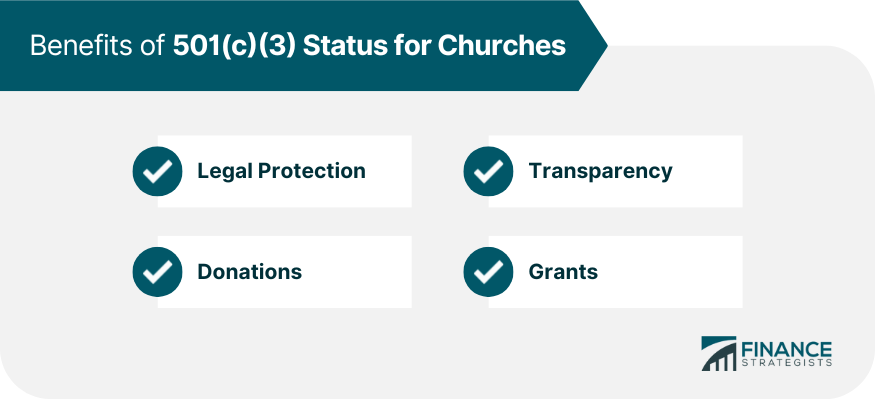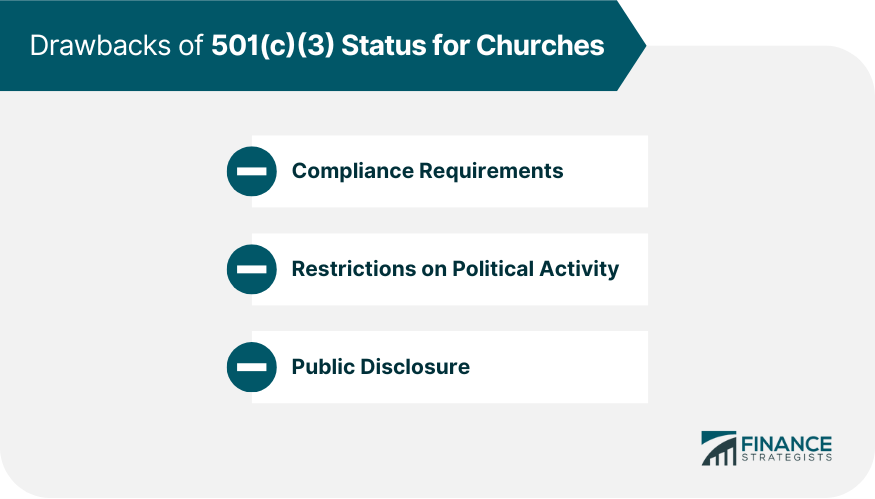Churches are automatically recognized by the IRS as 501(c)(3) organizations if they meet the criteria in section 501(c)(3) of the Internal Revenue Code. They do not need to formally apply or submit annual income information, though they may do so if they wish. In the United States, a 501(c)(3) organization is a tax-exempt nonprofit organization that is eligible to receive tax-deductible donations from individuals and businesses. These organizations include charities, educational institutions, religious organizations, and more. 501(c)(3) organizations are granted tax-exempt status by the Internal Revenue Service (IRS) under section 501(c)(3) of the Internal Revenue Code. This means that they do not have to pay federal income tax on the donations they receive, as long as they meet certain requirements. In addition to tax-exempt status, 501(c)(3) organizations are also eligible for a variety of other benefits, including exemption from state sales tax, eligibility for grants, and access to reduced postal rates. To obtain 501(c)(3) status, an organization must meet the following requirements: The organization must be organized and operated exclusively for religious, charitable, scientific, literary, or educational purposes, or for the prevention of cruelty to animals or children. No part of the organization's net earnings may benefit any private shareholder or individual. The organization may not engage in any political campaigning or lobbying. The organization must file Form 1023, Application for Recognition of Exemption Under Section 501(c)(3) of the Internal Revenue Code, with the IRS. The organization must also comply with various other IRS regulations, including maintaining accurate financial records and filing annual information returns. Prior to the 19th century, churches were generally not subject to taxation. However, as the federal government began to rely more heavily on taxation to fund its operations, churches came under greater scrutiny. In 1894, Congress passed the Wilson-Gorman Tariff Act, which included a provision for a tax on corporate income. This provision was challenged in court by a group of religious organizations, including the Episcopal Diocese of Chicago and the Jewish Publication Society. The Supreme Court ultimately ruled that the tax was unconstitutional, as it violated the First Amendment's guarantee of the free exercise of religion. Following this ruling, Congress passed the Revenue Act of 1913, which established a federal income tax. The act included a provision exempting churches and other religious organizations from taxation. This exemption was based on the idea that churches provide a public benefit that is not adequately provided by the government or other entities. This exemption for churches is still in place today, and it is codified in section 501(c)(3) of the Internal Revenue Code. However, the language of the code does not specifically mention churches. Instead, it refers to organizations "organized and operated exclusively for religious, charitable, scientific, literary, or educational purposes." This language has been interpreted by the IRS to include churches. The IRS defines a church as a "distinct legal entity" that is "organized for the purpose of carrying out religious worship." In order to qualify for the exemption, a church must meet the same requirements as other 501(c)(3) organizations, including being organized and operated exclusively for religious purposes, not benefiting any private individual, and not engaging in political campaigning or lobbying. It is important to note that the IRS does not require churches to apply for tax-exempt status. Instead, churches are considered tax-exempt automatically, as long as they meet the requirements set forth in the Internal Revenue Code. However, many churches choose to apply for formal recognition of their tax-exempt status by filing Form 1023 with the IRS. This can provide additional legal protection and clarity for the church and its donors. The exemption for churches from taxation has significant implications for both churches and the government. On the one hand, it allows churches to operate without the burden of paying federal income tax, which can free up resources for other purposes. It also allows churches to receive tax-deductible donations, which can be a significant source of funding. On the other hand, the exemption can be seen as a subsidy from the government to religious organizations. Critics of the exemption argue that it violates the principle of the separation of church and state, as it provides a special benefit to religious organizations that is not available to other types of nonprofit organizations. They also argue that the exemption can be abused by churches that engage in political campaigning or other activities that are not consistent with their religious mission. While churches are automatically tax-exempt under the Internal Revenue Code, they can still benefit from obtaining formal recognition of their tax-exempt status as a 501(c)(3) organization. Some of the benefits of 501(c)(3) status for churches include: Legal Protection: Formal recognition of tax-exempt status can provide legal protection for churches and their leaders, as it makes clear that they are operating in compliance with the law. Transparency: Filing Form 1023 with the IRS requires churches to provide detailed information about their finances and operations, which can promote transparency and accountability. Donations: While churches are automatically tax-exempt, obtaining formal recognition of tax-exempt status can make it easier for donors to understand the tax implications of their donations and can provide additional assurance that their donations will be used for charitable purposes. Grants: Some government and private grants are only available to organizations that have obtained formal recognition of tax-exempt status as a 501(c)(3) organization. While there are many benefits to obtaining 501(c)(3) status for churches, there are also some potential drawbacks. These include: Compliance Requirements: Obtaining formal recognition of tax-exempt status requires churches to comply with various IRS regulations, including filing annual information returns and maintaining accurate financial records. This can be a significant administrative burden for smaller churches. Restrictions on Political Activity: As a 501(c)(3) organization, churches are prohibited from engaging in political campaigning or lobbying. This can limit their ability to advocate for certain issues or candidates. Public Disclosure: Filing Form 1023 with the IRS requires churches to provide detailed information about their finances and operations, which becomes public record. This can make it easier for critics to scrutinize the church's activities. Churches are exempt from taxation under the Internal Revenue Code, but they can still benefit from obtaining formal recognition of their tax-exempt status as a 501(c)(3) organization. While there are many benefits to obtaining 501(c)(3) status, there are also potential drawbacks that churches should be aware of before pursuing formal recognition. Ultimately, the decision of whether or not to pursue 501(c)(3) status is up to individual churches and their leaders. It is important for churches to carefully weigh the potential benefits and drawbacks before making a decision. It is also important for policymakers to continue to evaluate the exemption for churches from taxation and consider whether it is consistent with the principle of the separation of church and state. While the exemption has a long history in the United States, it is worth considering whether it is still appropriate in light of current legal and social realities. Overall, the question of whether churches are 501(c)(3) organizations is not a simple one, and it requires an understanding of the history of churches and taxation in the United States, as well as the requirements for obtaining 501(c)(3) status. By providing clarity on this topic, we can help churches and policymakers make informed decisions about their tax status and the implications that come with it.Are Churches 501(c)(3) Organizations?
What Is a 501(c)(3) Organization?
History of Churches and Taxation
Exemption for Churches Under the Internal Revenue Code
Implications of Tax Exemption for Churches
Benefits of 501(c)(3) Status for Churches

Drawbacks of Obtaining 501(c)(3) Status for Churches

Conclusion
Are Churches 501(c)(3) Organizations? FAQs
A 501(c)(3) organization is a tax-exempt nonprofit organization that is eligible to receive tax-deductible donations from individuals and businesses.
Yes, churches are automatically considered tax-exempt under the Internal Revenue Code, but they can still benefit from obtaining formal recognition of their tax-exempt status as a 501(c)(3) organization.
Benefits of 501(c)(3) status for churches include legal protection, transparency, tax-deductible donations, and eligibility for grants.
Potential drawbacks include compliance requirements, restrictions on political activity, and public disclosure of financial information.
Critics of the exemption argue that it violates the principle of the separation of church and state, as it provides a special benefit to religious organizations that is not available to other types of nonprofit organizations.
True Tamplin is a published author, public speaker, CEO of UpDigital, and founder of Finance Strategists.
True is a Certified Educator in Personal Finance (CEPF®), author of The Handy Financial Ratios Guide, a member of the Society for Advancing Business Editing and Writing, contributes to his financial education site, Finance Strategists, and has spoken to various financial communities such as the CFA Institute, as well as university students like his Alma mater, Biola University, where he received a bachelor of science in business and data analytics.
To learn more about True, visit his personal website or view his author profiles on Amazon, Nasdaq and Forbes.















